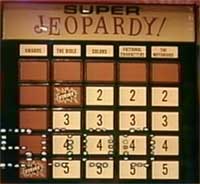 When IBM’s Deep Blue computer beat chess world champion Garry Kasparov back in 1997, my reaction was pretty dispassionate: As someone who’s played only a few games of chess in my life, I simply didn’t have a deep understanding of the game or an emotional attachment to it. But when the news came out over the weekend that IBM is programming a supercomputer to play Jeopardy–well, that’s a breakthrough I can relate to. I haven’t watched the venerable game show much in years, but back in the 1980s, I planned my college courses around it to make sure I was home in time to watch (this was before I had a VCR). I get the game’s subtleties–it’s not just about having an encyclopedic knowledge of both serious stuff and pop culture, but also about being able to unpack the meaning of those questions-phrased-as-answers in a split second. And given that countless very smart people have gone on the show and fallen flat on their faces, I’ll be impressed if IBM’s computer manages an unembarrassing third-place finish. But I don’t have any difficulty dealing with the idea that a computer might someday beat any flesh-and-blood Jeopardy player on the planet.
When IBM’s Deep Blue computer beat chess world champion Garry Kasparov back in 1997, my reaction was pretty dispassionate: As someone who’s played only a few games of chess in my life, I simply didn’t have a deep understanding of the game or an emotional attachment to it. But when the news came out over the weekend that IBM is programming a supercomputer to play Jeopardy–well, that’s a breakthrough I can relate to. I haven’t watched the venerable game show much in years, but back in the 1980s, I planned my college courses around it to make sure I was home in time to watch (this was before I had a VCR). I get the game’s subtleties–it’s not just about having an encyclopedic knowledge of both serious stuff and pop culture, but also about being able to unpack the meaning of those questions-phrased-as-answers in a split second. And given that countless very smart people have gone on the show and fallen flat on their faces, I’ll be impressed if IBM’s computer manages an unembarrassing third-place finish. But I don’t have any difficulty dealing with the idea that a computer might someday beat any flesh-and-blood Jeopardy player on the planet.
Thinking about the prospect of a computer taking on Alex Trebek, metaphorical buzzer in hand, led me to the conclusion that game shows in general aren’t a bad Turing Test-like gauge of artificial intelligence. They require knowledge–okay, only a little of it in many cases, but some. They’ve got a social component, by definition. They involve thinking on one’s feet, or the simulation thereof.
So how might a really well-programmed supercomputer fare at other famous game shows of the present and (mostly) past?

 It’s baseball season, everybody! Finally!
It’s baseball season, everybody! Finally!